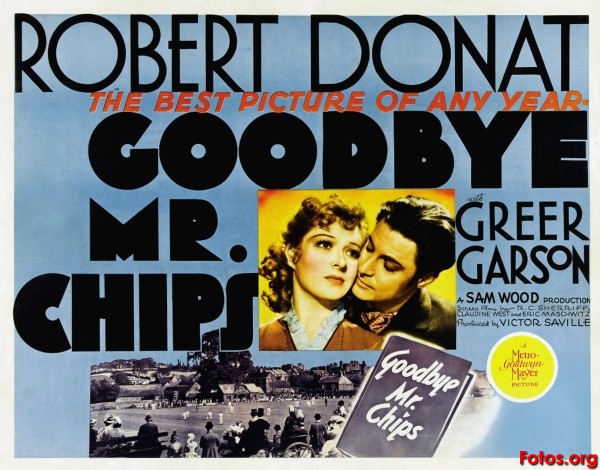Not to be confused with the 1969 musical remake starring Peter O’Toole in the lead role, this 1939 Oscar winner manages to be funny, sentimental, sad and uplifting over the course of its near two hour run time.
I caught it over the Easter weekend – the perfect time to see such film – and how fortunate I was because it’s yet another one of those notable movies of yesteryear that had so far escaped me.
Mind you, it’s not a film that’ll bring about a surge of adrenaline, so shelve it for another day if you’re up for some fist pumping action. Instead it’s a gentle character-led tale about the life and career of a teacher at a boys’ boarding school set in England.
The body of the movie is a memory so at the outset, we see the aged Mr Chipping (admirably played by Robert Donat) confined to his bed with a cold. His long career at Brookfield Pubic School is relayed to us in flashback and it begins in 1870 when we see the 20 year old Mr Charles Edward Chipping arrive for his first day as a teacher of Latin.
That first day is a bit shaky and the little rascals in his classroom give the poor idealistic new arrival a bit of a hard time. So he gets strict which earns him their respect but not their affection. But as the terms come and go and the years pass by, his relationship with his pupils improves and his position at the school gains importance when he is made senior master.
At one year’s end though, his high hopes of being appointed house master for the following year come to nothing and so to stop him from languishing in sorrow, the German teacher, Max Staefel (Paul Henreid), persuades old Chipping to join him on a walking holiday in his native Austria.
It is here that Chipping meets Kathy Ellis (the lovely Greer Garson), a forward thinking English woman who is also on holiday. Despite their obvious differences of character and age (she is about half his 50), they fall completely in love and marry.
Back in England, the new Mrs Chipping makes quite a stir at the school with her charming, friendly manner and her influence on ‘Chips’ as she calls him subsequently influences his ability to interact with the boys. Alas, tragedy arrives shortly after when his beloved wife dies in childbirth along with the baby but perhaps the silver lining (if one can find such a thing in so untimely a loss) is that her job was done. She made him a better teacher and a better man.
Devastated as he is (the entire school too), he throws himself into the only thing he has left. His work. And as the years pass and he becomes an eccentric but much loved fixture of the school, we see him enjoy a rapport with the boys that is quite unique. Indeed, he talks about teaching the sons and grandsons of many of his earlier pupils.
He reluctantly accepts retirement in 1914 but is such a part of the school that he remains on campus. However, with the war taking so many of the younger men off to fight he is called back to serve as headmaster – his lifelong dream and his wife’s prediction come true – albeit temporarily. Over the course of the next four years, he is saddened to read out the names of many former pupils and teachers who have died in battle, one of which was his friend and colleague Max Staefel, who had perished fighting on the German side.
He retires permanently in 1918 and dies fifteen years later, his last words summing up his sense of contentment.
The film had stiff competition at the Academy Awards that year from Gone With The Wind. Both films were nominated in the same seven categories (Outstanding Production, Best Director, Best Actor, Best Actress, Best Writing, Screenplay, Best Editing, Best Sound, Recording) but Donat beat Clark Gable to the Best Actor award. MGM’s southern epic would take five of the others while When Tomorrow Comes, a romantic drama starring Irene Dunne and Charles Boyer, took the award for Best Sound.
Donat was well deserving though. His performance is a perfectly judged progression of character and often quite moving. The fact that he ages 63 years over the course of the film is remarkable, not only in appearance but in manner.
The film is based on the 1934 novel of the same name by James Hilton and was directed by Sam Wood, whose credits include A Night at the Opera, A Day at the Races and For Whom the Bell Tolls. It was shot on location in Repton, Derbyshire and at Denham Film Studios in Buckinghamshire. The man who captured those interior and exterior images so ably was one of Britain’s most successful cinematographers, Freddie Young whose expertise won him three Oscars for Lawrence of Arabia, Doctor Zhivago and Ryan’s Daughter during a career that spanned more than fifty years.
In 1999, Goodbye, Mr. Chips was voted number 72 in the BFI’s Top 100 British Films poll.
It’s a beautiful film that if you haven’t yet caught is well worth a look.
